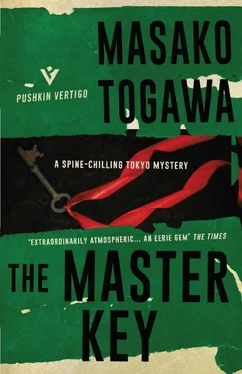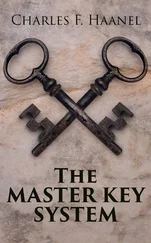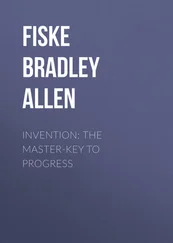The dentist was particularly slow that day, fussing over whether he’d done a good job or not, and so it was a full thirty minutes before I got away. When I got back to the car, there was no sign of George. I asked around the neighbourhood, but no one had seen him.
Of course, he was then four years old, just the age when children like to do things by themselves, and he was never one to settle in any place for long. So I thought he had left the car of his own accord and was playing somewhere around the hospital.
Nonetheless, I phoned my husband right away, but unfortunately he was out of his office. Presuming that George would make his way back to the hospital, I reported his disappearance at the reception desk and then went back to the waiting room.
I waited till it got dark, but there was no sign of the boy. I tried to call my husband several times, but to no avail. In the end l drove back to our house in Denenchofu, and just as I got back my husband walked in.
As soon as he heard my story, my husband decided to go to the local police station. But just at that moment, those devils of kidnappers telephoned the house. If the call had been a few seconds later, I would have taken it and would have heard the kidnapper’s voice. But as luck would have it, my husband was right by the phone when it rang. He picked up the receiver and listened, his face becoming grimmer all the time. Finally, he just said ‘All right’ and put the phone down. He then took my hands between his and earnestly bade me to do what he told me if we were ever to see George alive again. At the time, I went along with what he said, thinking it best under the circumstances. He said that if we were to save our son’s life, I must promise not to contact the police, as he had done.
Well, as you know, the criminals broke their side of the promise. They betrayed us. We couldn’t contact the police and get their help, but just had to wait for the one who phoned to contact us again—which he never did.
Even though it may be like crying over spilt milk, looking back now I really wish that I had insisted on calling the police right away. At the time, I didn’t want to go against my husband for fear of hurting him, but within a year of George’s disappearance our marital life came to an end anyway. We divorced, and the alimony he agreed to pay me left me with no financial worries, so that I was able to devote myself to searching for George. I went up and down the length and breadth of Japan, visiting every Christian orphanage and school where mixedblood children are to be found, but all to no avail.
Those about me pointed out that a half-caste child could not just get lost in the crowd like a pure-blooded Japanese, and that there was no point in aimlessly searching without even the basis of a rumour to go on. I could not but accept the logic of their view, but nonetheless it was unacceptable to me and I carried on just the same.
In addition, the police were doing their best to find George, but without success.
I had felt sure that sometime, somehow or other, I would hear about George. But as the days and months and years passed with no tidings whatever, I began to give up hope and even resign myself to the prospect of never hearing from him again.
And then, just recently, two things happened that rekindled my hopes. First of all, I still make it my habit to pass by my old house in Denenchofu at least once a day, and walk about the neighbourhood in the faint hope that George might just remember his past and turn up in the area. Well, I was in that vicinity the other day when a young man who wore the uniform of one of our best universities called out to me across the street.
I took it he was mistaking me for someone else until he made it clear that he recognised me as George’s mother. Then I remembered him. He was Fumio Kurokawa, the son of our old daily maid. Although he was some four years older than George, he used to come and play with him from time to time.
He expressed his sympathy to me concerning George, and then told me how he happened to be in the neighbourhood:
‘It’s ages since I’ve been round here, but we’ve been having our annual classmates’ reunion at my primary school. Everything seems to have changed since our day! Big shiny new concrete buildings, and half the teachers are new. However, they’d got out some of our old work—pictures we’d painted, test papers, essays and so forth. And, do you know what, one of my early compositions was on display— “My little foreign friend” it was called, and it was all about George! So it’s really rather appropriate that I should bump into you again after all these years!’
He went on to describe what he’d written, and one thing really made me think. You see, he’d described in detail how I used to go to the dentist every morning at that time, and how I used to take George with me. There was our daily life being set down in a Japanese child’s essay, detail by detail, and all without our knowing.
Furthermore, the essay subject was specially set for him by his teacher, a Miss Chikako Ueda, who no longer teaches there.
Well, since then, I’ve been thinking more and more about young Kurokawa’s essay. And the more I think about it, the more I feel convinced that there is some link between that essay and George’s disappearance. It’s as if, after all these years, I’ve suddenly found the traces of a footprint of my vanished child.
I fully realise that this is just a wild fancy, and I promise you I am trying to resign myself to the inevitable. But a drowning man will clutch at any straw, and the fact that you wrote to me on the same day seems possibly to be more than a mere coincidence.
I don’t mean just the letter itself, although it aroused sweet memories in my heart to receive a letter from my old teacher. When I saw your address on the back of the envelope, I suddenly realised that you are living in the same apartment block as the teacher who set Fumio Kurokawa to write an essay on his little foreign friend all those years ago. I am not a religious person, but at that moment I began to tremble all over—it seemed as if, at last, Divine Providence was beginning to take a hand in my affairs.
After seven years of darkness, I think I can at last see a little ray of light ahead.
Of course, I wouldn’t dream of suggesting that Miss Chikako Ueda was directly involved in the kidnapping. I just wonder if she remembers letting anyone else see that essay at that time. So if you happen to speak to her at any time, I wonder if you could raise the subject delicately and see what you can find out.
I beg you to excuse the self-centredness of a woman who has lost her only child and, if it is not too much trouble, to do what you can to help me.
Yours sincerely, Keiko Kawauchi
It would not be going too far to say that this letter altered the whole course of the rest of Yoneko Kimura’s life. She had written several hundred rather meaningless letters to her former pupils just to pass the time; now at last one of them was to bear dramatic fruit.
Although they lived in the same building, they were on different floors, so Yoneko knew very little about Chikako Ueda. She had passed her in the hallway a few times, that was all.
She spent the next week collecting information on her quarry, discreetly questioning her neighbours and the receptionists. The following facts emerged:
1. She had quit her job as a primary school teacher six years previously, giving out that she was getting married.
2. But there had been no sign of a suitor, let alone a marriage, and she had subsequently spent most of her time locked in her room alone.
Читать дальше












